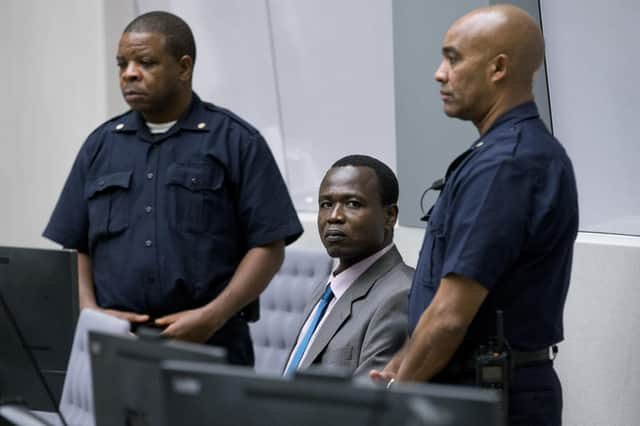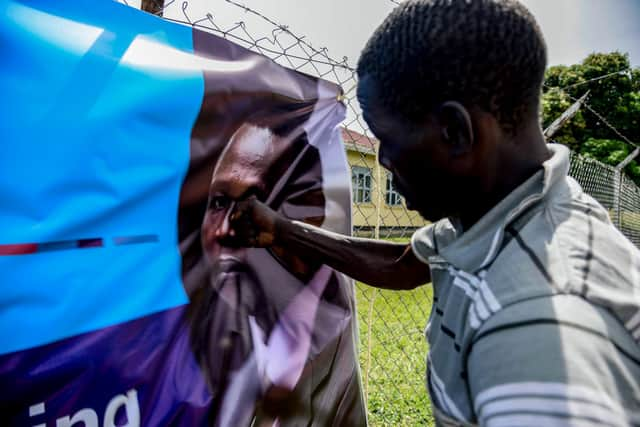International Criminal Court case against former Lord's Resistance Army commander Dominic Ongwen raises serious questions about child soldiers – Dr Paul Behrens


Grave crimes are committed against them, starting, often enough, with the brutal abduction from their families. They are frequently made to watch violent treatment inflicted on others, and when, as new recruits, they are forced to commit terrible crimes themselves, their path of suffering has only just begun.
Before the appeals chamber of the International Criminal Court (ICC), the hearing in the case of Dominic Ongwen, a man found guilty of the conscription of child soldiers, came to an end last month.
Advertisement
Hide AdAdvertisement
Hide AdOngwen was a high-ranking commander in the Lord's Resistance Army – an extremist rebel group in Uganda accused of war crimes and crimes against humanity and led by his superior, Joseph Kony.
In that hearing, I was an amicus curiae – one of several experts on international law whom the Chamber wanted to consult. I teach international criminal law at the University of Edinburgh, where the subject has a long tradition, going back beyond the first judgments of the International Criminal Court in 2012.
The court had its predecessors which dealt with more specific situations, including the International Criminal Tribunals for the former Yugoslavia (dealing with the civil wars following the breakup of Yugoslavia) and for Rwanda (dealing with the atrocities committed against the Tutsis in 1994). Their cases were followed with great interest in academia, and we explored their findings in our research.
But the atmosphere in the courtroom is something different still: more formalised and attended by people whose contributions may well change the direction of the law: in particular, the five appeals judges who presided over the hearing in blue robes and white bands, led by the Peruvian judge Luz del Carmen Ibañez and including the president of the ICC himself, the Polish judge Piotr Hofmański.


Ongwen, too, was in the courtroom – sitting only a few rows away from us, smartly dressed in suit and tie and looking, if anything, unexpectedly calm. But appearances do not always give a truthful look into the soul of men.
Last year, the trial chamber had found Ongwen guilty on more than 60 charges. The child soldier charge was among them, but also torture, rape and murder, sexual slavery, forced marriage and attacks on the civilian population.
He appealed the judgment, but even his appeal did, for the most part, not contest the facts behind the crimes. It rather noted that there were special circumstances that had to be taken into account.
One of these aspects was the 'insanity defence' – the claim that Ongwen had suffered from a mental disease or defect. The problem is that there was little evidence of that when the crimes were committed – certainly no indication that he was unable to understand what he was doing or that his actions were unlawful.
Advertisement
Hide AdAdvertisement
Hide AdDuress was another point: the defence claimed that Ongwen had to follow orders; otherwise, Kony might have had him killed. And the warlord would have known about Ongwen's behaviour, because – so it was believed in the militia – he had supernatural abilities. Kony was allegedly in touch with 'the spirits' who would have told him about any insubordination.
That sounds bizarre. It is bizarre. But belief in demonic forces is perhaps closer to our part of the world than one may think (ten years ago, the story of 'Slender Man' – a scary figure appearing in internet lore – sent teenagers around the world into a panic and caused an attempted killing in the USA).
There is another point which makes the Ongwen case unusual: he himself had been a child soldier. The suffering he must have endured is almost beyond imagination – he was kidnapped on his way to primary school, put into an environment which his judges described as “extremely violent”, subjected to beatings and forced to commit horrible crimes himself. When he was 13, he learnt that his own parents had been killed.
After that, however, he rose through the ranks. He took a leading role in the Lord's Resistance Army, and rather than seeking to escape, he eventually became commander of the Sinia brigade – one of the four units that made up the militia, where he recruited child soldiers himself, some as old as he had been when he was abducted.
The appeals chamber will now deliberate the case and will have to wrestle with these difficult questions, including the impact of Ongwen's abusive upbringing on his own responsibility.
Child soldiers cannot be tried by the court, they are below the age of criminal responsibility. But former child soldiers? One cannot help thinking that more than ten years after abduction, when Ongwen himself committed many of the crimes he had witnessed as a child, the assessment must change.
If former child soldiers cannot be punished at all, militia leaders all over the world will take note and press even more children into their ranks – knowing that fighters like that will forever escape the arm of the law.
The fate of every former child soldier is tragic. That must be considered at sentencing – and it was in Ongwen's case (his total sentence was 25 years’ imprisonment). But it does not change the fact he committed the crimes, knowing full well what he did. Responsibility has to start somewhere.
Advertisement
Hide AdAdvertisement
Hide AdWhen a man knows from his own experience what his victims endure and still proceeds to visit these horrors on them, there is no injustice done if he must face the consequences at the hands of international justice.
Dr Paul Behrens is co-author of Elements of Genocide. He teaches international criminal law at the University of Edinburgh
A message from the Editor:
Thank you for reading this article. We're more reliant on your support than ever as the shift in consumer habits brought about by coronavirus impacts our advertisers.
If you haven't already, please consider supporting our trusted, fact-checked journalism by taking out a digital subscription.
Comments
Want to join the conversation? Please or to comment on this article.
